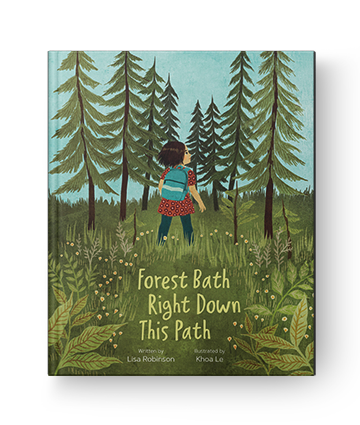
Lisa Robinson has a BA in psychology from Cornell University, an MD from Tufts University, and an MFA in Writing for Young People from Lesley University. She works as a therapist for children, teenagers, and adults, and is the author of numerous picture books. Lisa lives in Newton, Massachusetts. Learn more at author-lisa-robinson.com.
Author photo © Cheryl Clegg

As we wander the forest’s moss-lined paths, we smell pines and firs, touch bark and berries, and listen to birds and chipmunks. The hike ends at a rocky beach where we swim and explore tidepools. When we leave, we feel peaceful and calm. The name for this kind of soothing experience is forest bathing.

There’s evidence that smelling chemicals from trees called phytoncides and microbes from soil called mycobacterium vaccae may reduce stress and boost immune function.
I work as a child psychiatrist to help children, teens, and adults, and I’m always looking for ways to help people manage stress and anxiety. Some of the recommendations I make for doing this include exercise, taking time away from screens, meditating, and connecting with family and friends. I try to do these things myself, too! Every morning I take a half hour walk through the woods near my home.

I’m also a parent of two children (now young adults), and I’ve been concerned about the ways phones and screens are interfering with paying attention to the natural world as well as one another. It’s known that spending a lot of time on social media is contributing to the worsening of teens’ mental health. Adults need to take time away from their phones, too. That’s why the main character of my book, Kayla, encourages her father to put away his phone and fully engage in their walk through their forest. Children want their parents’ undivided attention; often they’re the ones encouraging adults to turn off their phones and be present.

I hope this book inspires you to spend time with your loved ones outdoors and soak in all its beauty and mental health benefits. Happy forest bathing!
Wishing you fresh air and sunshine,
Lisa Robinson
P.S. I invite you to download the free story time kit with five activities for children to learn more about forest bathing—from heading out on a sensory expedition to exploring their senses to making art in nature.

Lisa Robinson is a therapist, picture book writer, and nature enthusiast. She lives in Newton, Massachusetts. Every summer her family travels to coastal Maine for two weeks. The highlight of the trip is a walk through Barred Island Preserve on Deer Isle. The animals and plants mentioned in her new children’s book, Forest Bath Right Down This Path, are all found there. Learn more about Lisa and her work at author-lisa-robinson.com.

Learn More
Amazon | Barnes & Noble | Bookshop | Sounds True
Most people feel trapped in a thousand ways. But more often than not, this sense of entrapment us into putting our heads down and getting the things we are expected to get done, done. We can’t often see the entrapment, especially if it looks like the result of our own choices in life. But were they truly our own choices? What if some of the choices we made in life have never really been ours to begin with?
I want to take us back a little. Back to when we were younger. When we had to rely on the wisdom of our elders, and those who have been in this life much longer than us. In my upcoming book Invisible Loss, I write about that time in our lives when we were at our most rebellious:
Disobedience—as a child, as a teen, as an adult in the world of work and home—is an act that creates invisible suffering. We learn to survive that repeated pattern of being commanded by our elders to be “good.” In order to be good and obey, we may create a life closer to that command but further away from our Original Self. We may work hard trying to be good, trying to please and fit into the mold created for us, but that only helps to build our Waiting Room life.
But time in the Waiting Room doesn’t need to last forever. And you don’t have to die inside it. There are parts within you that can bring forth a life worthy of your human existence. Places within yourself that have no shame.
As long as we have been alive, creating a life that aligns closest to the wishes of our caregivers and protectors blinds us to the life that we could choose for ourselves. That life is completely hidden even if we think we know our wishes. Often, only when we go through tragic or invisible losses, do we start to question those choices. Dare I say, these moments are opportunities to exit the loop of being “good.”
It is time to interrupt our regular transmission. It is time to be clear when it comes to what it is we are trying to communicate to the people in our lives. It starts from no longer trying so hard to fit into the mold that was created for us. No matter how old we are, we can always break outside this mold and align our choices with our true values and desires.
This is not an easy task. I understand that. At the core of my book, Invisible Loss, I’ve created tjos easy practice to help set you on the right path to your Original Self. I call it Mental Stacking:
What Is Mental Stacking?
Mental Stacking is the ability to intentionally layer your thoughts to replace unconscious, Survivor-based
thinking with Wisdom-based thinking. In doing so, these Wisdom-based thoughts can more easily be converted into real-life action. This Stacking practice allows you to access your true and authentic self (your Original Self) and entrust it with the controls of your life. Here is what a basic Stack looks like:
Your Mental Stack leads you to a specific next step that may not always be easy to see without the power of each previous layer in the Stack.
Here’s to a great new chapter ahead,
Christina Ramussen

Invisible Loss
Amazon | Barnes & Noble | Bookshop | Sounds True

Christina Rasmussen is an acclaimed grief educator and the author of Second Firsts and Where Did You Go? She is the founder of the Life Reentry Institute and has helped countless people break out of what she coined the “waiting room” of grief to rebuild their lives through her Life Reentry® Model, a new paradigm of grief, based on the science of neuroplasticity. She lives in Austin, Texas. For more, visit christinarasmussen.com.
Author photo © Marc Olivier Le Blanc
Heartbreak is a universal human experience. Yet we often lack the vocabulary and the skills needed to move through heartbreak wisely. This was certainly the case for Sara Avant Stover, whose decades of spiritual practice and deep inner work could not prepare her for the “serial heartbreaks” that upended her life. In this podcast, Tami Simon speaks with the author of Handbook for the Heartbroken about the challenges of navigating loss in a “heartbreak-illiterate” society.
Discover how our most painful experiences can become a gateway to personal empowerment and healing, in this practical conversation on: taking on a disposition of tenderness; the impacts of cascading losses; entering the depths of our pain; the metaphor of the tightrope over the chasm; moving from self-judgment to self-acceptance; how Internal Family Systems (IFS) therapy helps us during heartbreak; the quiet “soul” powers our pain can open us to; grief; supporting the heartbroken; rituals for letting go; the midlife initiation; and more.
Note: This episode originally aired on Sounds True One, where these special episodes of Insights at the Edge are available to watch live on video with exclusive access to Q&As with our guests. Learn more at join.soundstrue.com.
Tapping is a simple form of energy psychology that can help you transform difficult emotions; overcome addiction, anxiety, or depression; change self-defeating habits; and more. Today, there are more than 175 peer-reviewed scientific studies supporting its efficacy. Yet despite 20 years of growing evidence, many people remain skeptical. In this podcast, Tami Simon speaks with the authors of the new book Tapping—Donna Eden and Dr. David Feinstein—about why the technique works and how to practice it successfully.
Listen in to this exciting, illuminating conversation on: energy medicine and the subfield of energy psychology; Thought Field Therapy and Emotional Freedom Techniques; how tapping produces such incredibly fast results; auras and chakras; acupressure points and piezoelectricity; the acceptance statement and other tapping protocols; breaking the cycle of inner judgment and negativity; the deep and authentic personal work tapping requires; subjective units of distress (SUDs) and the affect bridge; obstacles to change and psychological reversals; tapping as a tool for trauma healing; and more.
Note: This episode originally aired on Sounds True One, where these special episodes of Insights at the Edge are available to watch live on video with exclusive access to Q&As with our guests. Learn more at join.soundstrue.com.
© 2024 Sounds True. All rights reserved.